Community Dental Health

- Cover Date:
- December 2011
- Print ISSN:
- 0265 539X
- Vol:
- 28
- Issue:
- 4
Association of clinical oral health status with self-rated oral health and GOHAI in Japanese adults
Objective: The objective of this study was to investigate clinical oral health status relationships that affect quality of life (using the 12-item General Oral Health Assessment Index (GOHAI)) and self-rated oral health in a community of Japanese residents. Methods: 459 residents of Yokote City, Japan aged 40-55 years had oral health examinations and completed self-administered questionnaires collecting data on age, gender, GOHAI items and self-rated oral health. Linear regression analysis was performed with GOHAI or self-rated oral health as a dependent variable and gender, age and indicators of oral health status as independent variables. Results: The GOHAI indicated 42.7% of subjects were concerned about the appearance of their teeth, 30.1% were worried about teeth problems and 27.5% concerned about sensitive teeth. Analyses showed that gender, decayed teeth, oral dryness and missing teeth were significantly associated with variation in GOHAI scores, and that gender, decayed teeth, oral dryness and oral hygiene were significantly associated with variation in self-rated oral health. Conclusion: This study revealed that in this sample of Japanese adults aged 40-55 years, decayed teeth and oral dryness affected both GOHAI and self-rated oral health, whereas missing teeth affected GOHAI and oral hygiene affected self-rated oral health. Subjects did not recognise periodontal disease as a quality of life impacting condition or as a health problem.
Key words: Quality of life, self-rated oral health, dental health status, Japanese adults, GOHAI
- Article Price
- £15.00
- Institution Article Price
- £
- Page Start
- 297
- Page End
- 300
- Authors
- T. Zaitsu, M. Ueno, K. Shinada, S. Ohara, F.A.C. Wright, Y. Kawaguchi
Articles from this issue
- Title
- Pg. Start
- Pg. End
- Why has oral health promotion and prevention failed children requiring general anaesthesia for dental extractions?
- 255
- 258
- Predictors of utilisation of dental care services in a nationally representative sample of adults
- 269
- 273
- Applicability of both dentist and patient perceptions of dentists’ explanations to the evaluation of dentist–patient communication
- 274
- 279
- Evaluation of a preventive program based on caries risk among mentally challenged children using the Cariogram model
- 286
- 291
- The effect of a modified fluoride toothpaste technique on buccal enamel caries in adults with high caries prevalence: a 2-year clinical trial
- 292
- 296
- Association of clinical oral health status with self-rated oral health and GOHAI in Japanese adults
- 297
- 300
- Prevalence of periodontopathogens in a black Brazilian secluded community matched with a black urban population
- 301
- 304
- Incisor trauma in a Turkish preschool population: Prevalence and socio-economic risk factors
- 308
- 312
- Malocclusion and orthodontic treatment need measured by the Dental Aesthetic Index and its association with dental caries in Indian schoolchildren
- 313
- 316
